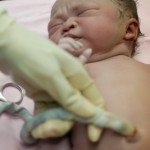Four main causes of PPH have been identified, they are as follows: 1. A uterine atony, in which your uterus does not contract and continues to bleed after birth (it is usually caused by placental retainment or an infection) 2. A retained placenta, or just some of placental and/or fetal tissue. 3. Trauma, which includes […]
episiotomy

The second stage of labour
The second stage of labour is the pushing stage of labour and when your baby will be born! It begins once you are 10cm dilated and will continue until your baby is delivered into the world. This stage of labour lasts between one and two hours, but like in the first stage of labour, it […]
Pain management after an episiotomy
An episiotomy or perineotomy is not a pleasant experience, especially during the first month after your baby’s birth when your incision is healing. We’re sorry mum, we hate to be the bearers of bad news. While recovering from an episiotomy most mothers report having constant pain in the location of the incision, pain when they […]
Episiotomy Recovery
An episiotomy or perineotomy is not a pleasant experience, especially during the first month after your baby’s birth when your incision is healing. We’re sorry mum, we hate to be the bearers of bad news. While recovering from an episiotomy most mothers report having constant pain in the location of the incision, pain when they […]
Types of Episiotomies
There are many types of episiotomies and if you need one, the method used on you will depend on the situation and your doctor’s preferences. Episiotomies differ in the direction and depth of the incision, but all are approximately 2½ cm. long. The 4 possible directions are: A median/midline incision: the perineum is cut directly […]
Avoiding an episiotomy
Episiotomies can be scary and for this reason we are sure you are looking for any way possible to avoid them. You’re in luck, because we have two brilliant ideas that could help you out! The first method reduces your chances of needing an episiotomy by 6%, we know that doesn’t seem like a lot, […]
Episiotomy
An episiotomy or perineotomy  is a surgical procedure that takes place during the second stage of labour. The procedure includes making an incision in the perineal area between the vagina and the rectum using surgical forceps. It is performed under local anesthetic and sutured closed with dissolvable stitches approximately one hour after birth. In the […]

Water birth: a safe alternative?
Water births, or giving birth while you are immersed in a pool of warm water, is a birthing method that has become increasingly more common in the UK over the last two decades. And as usual its rising popularity is accompanied by some controversy in the world of medical professionals. On one hand, water births […]